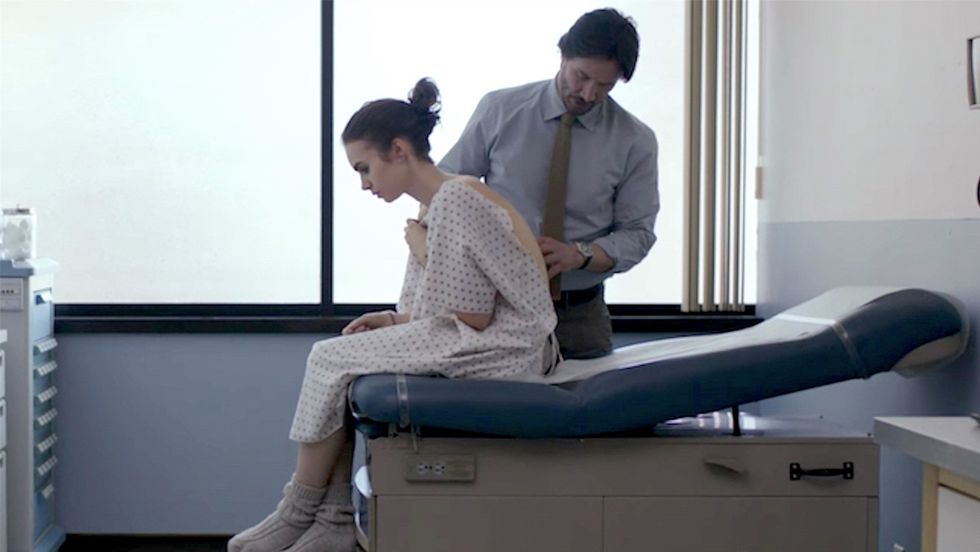Step 1: Open my sunken eyes, blinking as they swim in an abyss of dark circles.
Step 2: Run my hands over my fragile rib cage, assessing every ounce of fat I have yet to lose.
Step 3: Fight the urge to lay my drowsy, unrested head back on the pillow, and descend my cold feet onto the floor.
Step 4: Flip on the bathroom lights and analyze the imperfection that stares back at me in the mirror.
Step 5: Step onto the scale, my best friend and my worst enemy. Eventually, it will flash back numbers that would come to shock my doctor.
Step 6: Try and survive the day while fighting the voices in my head feeding me lies about myself.
This was my morning routine when I was anorexic. These routines vary from person to person – how they struggled may be different to the ways that I struggled. But one thing all victims of eating disorders have in common is this: We are fighters.
I had my doubts about Netflix's new movie "To the Bone" before watching it. The summary explains that the movie is about a girl (Lilly Collins) and her fight with anorexia nervosa. Knowing it most likely would be difficult to watch, I did my research before watching.
I read various reviews on it claiming that the show "glorifies" eating disorders, and even romanticizes it. While I respect everyone's opinion, I have one thing to say to those who hold these beliefs towards the show:
You are dead wrong. You missed the point completely.
I understand the precautions after the backlash of Netflix's "13 Reasons Why." Both hit very sensitive subjects. However, in no shape or form was this movie glorifying or promoting eating disorders.
An argument I have heard quite a bit was that, due to the fact there was a romance involving Ellen (Lilly Collins) and Alex Sharp. The point of this romance was not to preach that if one becomes anorexic, one can find love – which I believe is the main argument.
The point of this romantic conflict was to shed light on yet another dimension of eating disorders. Viewers assess the connection the two have, yet Ellen's disease stands in her way. She can't fathom loving anyone or having anyone love her because she can't come to love herself.
With self-acceptance comes self-love, and this disease blocks all ability to achieve either. Romance is impossible if you are already locked in a relationship with your addiction.
This brings me to my next point. You read the last word in the above paragraph, right? Yup, eating disorders are an addiction.
The show emulates this, and finally it is getting out there that eating disorders are not a choice or state of mind. In one scene in particular, during a meeting at the rehabilitation center Ellen is residing at, the director of the program states, "It isn't about being thin enough. There's never a 'thin enough.'"
Because eating disorders are not about that, it is about the addiction.
The high you feel when you step on the scale and the number drops just a little more. The low you feel when you've gained a little bit, and just like a junky, you crave more of it. More starvation. More purging. More. More. More. Until there's nothing left of you but what the addiction has driven you to. Just like a drug addict.
So often we point to the media for all of our issues. How that one girl on Cosmopolitan looked just so good with her thigh gap. Is this absolutely a great point? Yes! My body standards are absolutely ridiculous to achieve.
In fact, this may be where a lot of our problems are rooted. However, this isn't always the main focus behind eating disorders. Sometimes eating disorders aren't sparked behind wanting to be extraordinarily thin, though a majority of them may be.
However, in cases such as mine and the protagonist of "To the Bone," it was sparked by something more. Perhaps a need for control in a life that I felt I had no control over. Something that is consistent in a life where consistency is rare.
There are so many small things that this movie shines light on, as well. The odd, nitty-gritty things that come with eating disorders are thrown attention to. I remember when I was recovering, a food that I considered safe was apples.
I could not get enough apples. I felt that apples would help me recover and wouldn't make me fat. We see this odd manner shown in the rehabilitation center – in particular, where one girl's safe food is peanut butter. The panics that seem so unrealistic to a healthy person are finally shown in a way that's not ridiculing.
For instance, one scene Ellen faces her favorite candy bar and another disclaims that if she eats it, she will not end up being obese like her head is telling her she will. I remember waking up in a panic after having a granola bar for dinner, expecting a 400-pound girl to stare back at me.
Everything about this movie is raw and real. Yes, it is a very touchy subject, hence why the movie starts out with a trigger warning about the content. If you or someone close to you is struggling with or has struggled with an eating disorder, and wish to watch it, I recommend taking the approach I did.
I cuddled up with my loved one, took many pauses to check in with myself, and watched.





 The minimum wage is not a living wage.
StableDiffusion
The minimum wage is not a living wage.
StableDiffusion
 influential nations
StableDiffusion
influential nations
StableDiffusion













